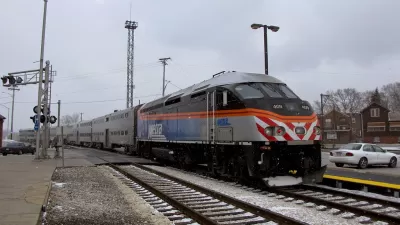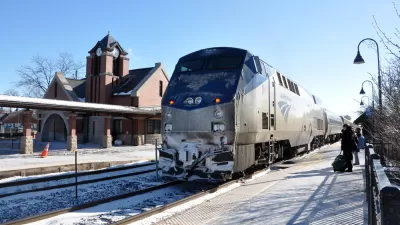If jobs, services, and other urban amenities are concentrated downtown, suburbanites can use transit to get there quickly without a car. Job sprawl makes transit useless outside central districts.

In cities with centralized job hubs like Chicago and Philadelphia, robust commuter transit makes it possible for suburbanites to go there and back again without a car. Daniel Hertz argues that centralizing urban amenities is the most effective way for cities to capitalize on transit.
Hertz writes, "suburbanites who take public transit to work are actually richer on average than suburbanites in the same neighborhoods who drive. Why is that? Because in places where high-end jobs are concentrated downtown, those high-end earners can take convenient express buses or commuter rail to work [...] If the urbanite works in the suburbs, she almost certainly drives; and if the suburbanite works downtown, there's a good chance he takes the train."
Looking at data from the 2013 American Community Survey, Hertz concludes that "what really matters for how you get to your job, even more than where you live, is where you work." While most suburbs are obviously ill-served when it comes to transit, planning for centrally-located jobs and services will make new commuter rail and buses a more attractive option.
FULL STORY: When it comes to transit use, destination density matters more than where you live

Alabama: Trump Terminates Settlements for Black Communities Harmed By Raw Sewage
Trump deemed the landmark civil rights agreement “illegal DEI and environmental justice policy.”

Study: Maui’s Plan to Convert Vacation Rentals to Long-Term Housing Could Cause Nearly $1 Billion Economic Loss
The plan would reduce visitor accommodation by 25% resulting in 1,900 jobs lost.

Planetizen Federal Action Tracker
A weekly monitor of how Trump’s orders and actions are impacting planners and planning in America.

Waymo Gets Permission to Map SF’s Market Street
If allowed to operate on the traffic-restricted street, Waymo’s autonomous taxis would have a leg up over ride-hailing competitors — and counter the city’s efforts to grow bike and pedestrian on the thoroughfare.

Parklet Symposium Highlights the Success of Shared Spaces
Parklets got a boost during the Covid-19 pandemic, when the concept was translated to outdoor dining programs that offered restaurants a lifeline during the shutdown.

Federal Homelessness Agency Places Entire Staff on Leave
The U.S. Interagency Council on Homelessness is the only federal agency dedicated to preventing and ending homelessness.
Urban Design for Planners 1: Software Tools
This six-course series explores essential urban design concepts using open source software and equips planners with the tools they need to participate fully in the urban design process.
Planning for Universal Design
Learn the tools for implementing Universal Design in planning regulations.
Caltrans
Smith Gee Studio
Institute for Housing and Urban Development Studies (IHS)
City of Grandview
Harvard GSD Executive Education
Toledo-Lucas County Plan Commissions
Salt Lake City
NYU Wagner Graduate School of Public Service





























